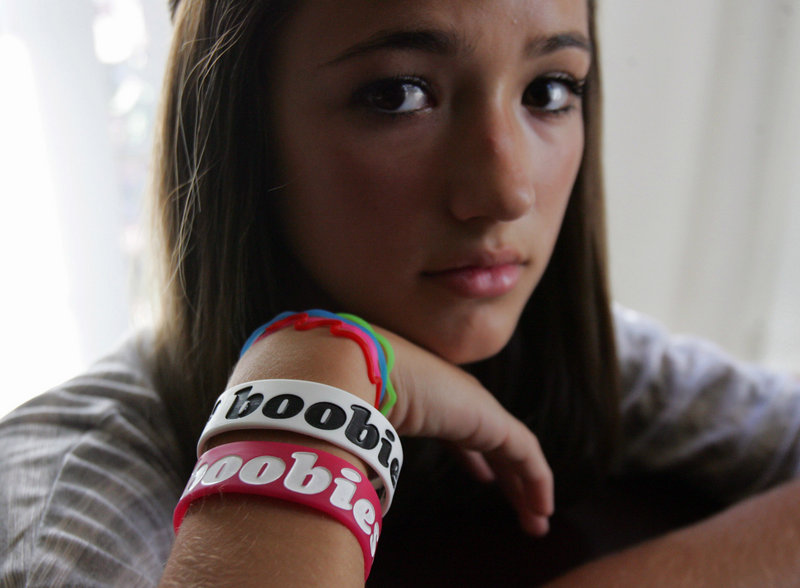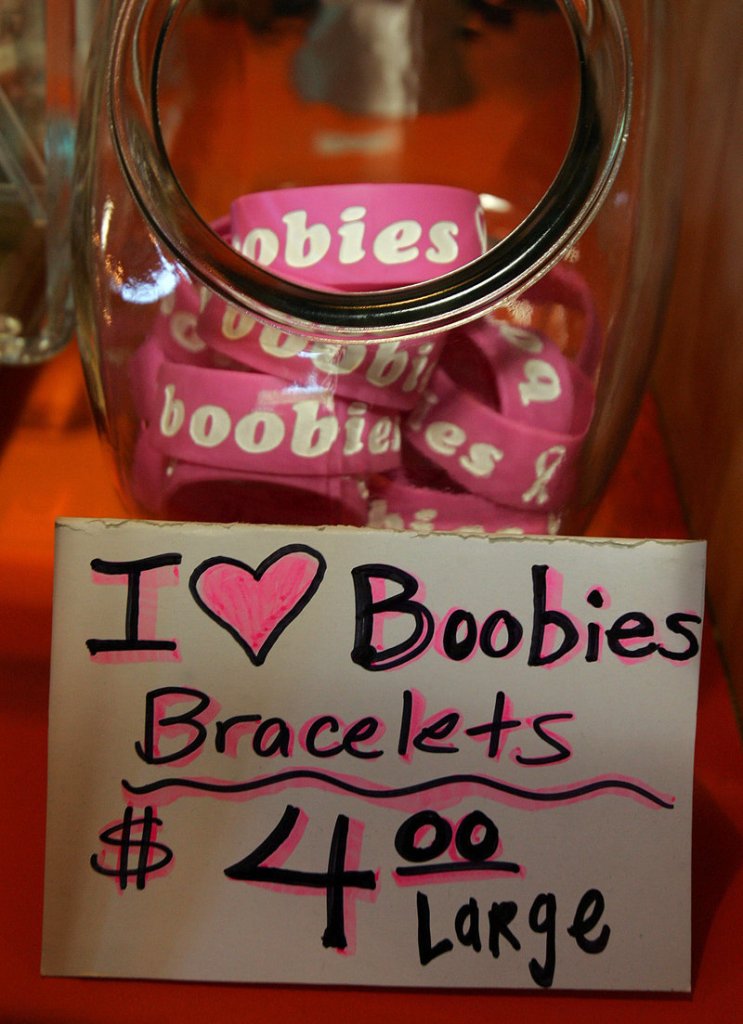ALLENTOWN, Pa. – When a federal court in Philadelphia convenes today, lawyers dressed in suits and armed with stacks of legal briefs are expected to appear before a judge, ready to do battle over a seven-letter plural noun that’s hard to say without cracking a smile: boobies.
Go ahead, try it. Boobies.
The slang term for a woman’s breasts stands trial in a free speech lawsuit between the Easton Area School District and two middle school girls, who were suspended in October for refusing to remove bracelets reading “I (Heart) Boobies!” in support of breast cancer awareness.
District administrators argue the word is lewd, vulgar and has no place in a middle school. Brianna Hawk, 13, and Kayla Martinez, 12, who are both represented by the American Civil Liberties Union of Pennsylvania, say the word is harmless and the district overreacted.
Now, U.S. District Judge Mary A. McLaughlin must decide whether to temporarily overturn the district’s bracelet ban in a hearing that will foreshadow the course of the case. Her decision could also send a signal to other school districts across the country that have enacted similar bans.
The proceedings, riveting for any dictionary worm, will focus almost solely on the meaning of “boobies,” both literally and when displayed in a school full of teenagers.
Nonprofits working to raise awareness for breast cancer began using the term “boobies” as a way to connect with a younger generation of girls.
The Keep A Breast Foundation, which created the bracelets in question, argues the word speaks to teenagers in their own voice.
“I have two teenage daughters, and they use that word,” said Carl Hittinger, an attorney representing the girls in the lawsuit. “It’s in no way meant in any sexual context whatsoever.”
Hittinger said his daughters use the word as a “softer, more neutral” term for breasts, which are often associated with mothers and grandmothers. “Boobies,” he argues, refers to a developing part of a girl’s body, and has never been used in a vulgar manner — in popular context or in a middle school.
“We’re talking about a bracelet worn in the context of breast cancer,” said Hittinger, noting the bracelets also reference the Keep A Breast Foundation. “This is a word that resonates with the kids of that age. It’s not scary, it’s understandable, it’s easier for them to deal with.”
The Easton Area administration argues otherwise, saying the word “boobies” on a bracelet in the context of a middle school doubles as sexual innuendo and violates the district’s dress code, which prohibits clothing with “nudity, vulgarity, obscenity, profanity, and double entendre pictures or slogans.”
According to prevailing case law, school districts can regulate clothing that causes a “substantial or material” disruption of the school day. The district in court filings argues the bracelets caused middle school boys to make inappropriate comments toward girls.
In one case, it writes, a boy inappropriately touched a girl.
But the district need not rely on proving disruption if it can prove that “boobies” is lewd or vulgar.
In Bethel School District v. Fraser, the U.S. Supreme Court sided with Bethel High School in Spanaway, Wash., which suspended a student for using vulgar language during a speech at a school assembly. The court also held that school boards have the right to determine and limit inappropriate speech.
According to Easton, the girls have “no First Amendment right to utilize double entendres and sexual innuendos to express their viewpoints in the context of a public school, particularly considering the plethora of other ways that they can express their support of breast cancer awareness.”
Muffy Siegel, an English and linguistics professor at Temple University said the two different interpretations of the word probably stem from a generational difference, and determining the true meaning in the middle school context depends on the audience.
“We could say “boobies” has a negative connotation for people of an older age and not a negative connotation for younger people,” Siegel said. “I am almost certain if we did that we would find that the middle school kids would find nothing offensive about it.”
The judge must determine which interpretation best represents the standard of the middle school community as a whole, not unlike the legal standard applied to determine obscenity.
So could a ruling calling “boobies” vulgar spell the end for the word?
Not likely, Siegel said.
“Most linguists would say that there’s never been a trial publicized enough to effect the way people see a word,” she said. “Word meanings will change as they want to change, and there’s very little our legal system can do about it.”
Send questions/comments to the editors.




Comments are no longer available on this story